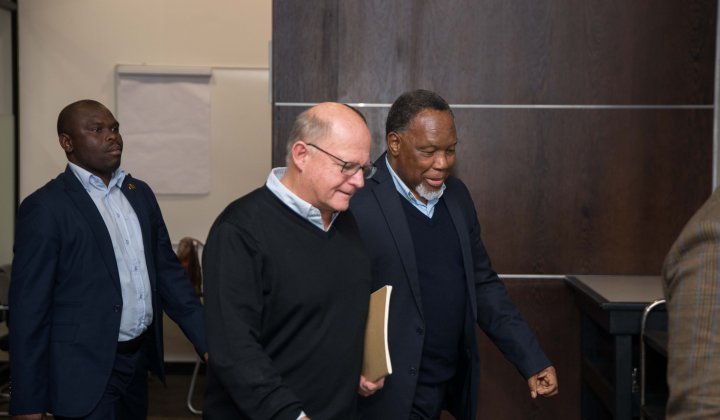In this edition, we feature research that examines the broader environment; industries that drive African economies and their communities, including mining, tourism, agriculture, and the ocean economy, as well as business trends like the adoption of AI and how to minimise investment risks on the Johannesburg Stock Exchange.
Artificial intelligence
Authors: Dawid Booyse and Caren B. Scheepers
Artificial intelligence affects every facet of business, not only by automating routine tasks but also because it is moving into the realm of automating decisions traditionally made by knowledgeable or skilled workers. Dawid Booyse, GIBS alumnus and head of application delivery management at HSBC, says, “While AI has shown promise in assisting human decision-making, there exist barriers and risks to adopting AI for decision-making. The study aimed to identify these issues in adopting AI for automated organisational decision-making.” He explains that the study applied an interpretive paradigm and conducted exploratory research through qualitative interviews with 13 senior managers in South Africa from organisations involved in AI adoption to identify potential barriers and risks to using AI in automated decision-making processes.
KEY FINDINGS
- Barriers to AI adoption in decision-making include human social dynamics, restrictive regulations, creative work environments, lack of trust and transparency, loss of power and control, as well as ethical considerations.
- The study uniquely applied the adaptive structuration theory (AST) model to AI decision-making adoption, illustrated the dimensions relevant to AI implementations, and made recommendations to overcome barriers to AI adoption.
PRACTICAL APPLICATION
Booyse explains that as the adoption of AI becomes ubiquitous in business, this research is of key importance. He says, “Not every situational problem or human process can be replaced with AI, and our research assists business leaders in discerning when to apply AI in decision-making. It is thus key for organisations to understand the limitations and pitfalls when adopting AI.” He concludes by saying, “Organisations can use our research to make the adoption of AI a less risky and smoother process and less costly.”
For the full. paper, go to: https://doi.org/10.1108/MRR-09-2021-0701
Financial investing
Equity issuance and share price performance on the Johannesburg Stock Exchange
Dirk Johan van Vuuren, Michael Ward, Chris Muller
Dirk van Vuuren, a consultant and senior lecturer at the University of Pretoria, says of this research, “One of the few mechanisms listed companies can utilise to raise capital for operational processes is through a rights issue. The process involves providing existing shareholders ‘an opportunity’ to buy additional shares at a discounted rate in proportion to their existing shareholding.” He adds, “If the shareholders forego their right to purchase, they may be subject to share dilution.” His research covered the period 2005 to 2022. He used an event study to determine the effect on the share price of JSE-listed companies (competing in different market segments) after announcing a rights issue and then after the realisation thereof.
Van Vuuren explains the practical application of the research. He says, “Predicting the behaviour of share prices for such events enables institutional investors and existing shareholders to seize opportunities or mitigate losses while increasing returns on their investment portfolios.”
KEY FINDINGS
- The research suggests that the share price typically drops below the 5th percentile after the announcement is made and continues to remain low for the next 30 days.
- Once implemented, the share price tends to increase beyond the 95th percentile and remains high.
- Additionally, the effect on resource-based companies is more pronounced, while value companies are more sensitive to the announcement of a rights issue than growth companies.
PRACTICAL APPLICATION
Van Vuuren explains the practical application of the research. He says, “Predicting the behaviour of share prices for such events enables institutional investors and existing shareholders to seize opportunities or mitigate losses while increasing returns on their investment portfolios.”
For the full. paper, go to: https://www.tandfonline.com/doi/full/10.1080/10293523.2023.2240560
Mining
Tarryn Brandling, Haley Pearson & Morris Mthombeni
The South African mining industry is complex and multi-faceted, and communication and accountability are critical for their long-term sustainability. This research looks at heavy industries such as mining, where safety is paramount. Organisations need a well-functioning system of accountability. Yet, to whom employees perceive they are accountable differs at varying hierarchical levels. This article reports on the findings from a study investigating sources of accountability at different organisational levels in a mining operation and the mechanisms used to manage such accountability.
KEY FINDINGS
- Blue-collar workers and supervisors considered self-accountability and accountability to line managers to be the primary sources of accountability.
- However, managers stressed the importance of accountability to regulatory bodies and the legal implications of non-adherence to prescribed standards.
- All participants perceived their reputations to depend heavily on their accountability relationships.
- Mechanisms used in the organisation to promote accountability included clarifying roles and responsibilities, building open and honest interpersonal relationships, implementing standardised policies and procedures, and offering financial incentives.
PRACTICAL APPLICATION
This study's practical application in a complex industry is to help mine leadership develop a conceptual accountability model. This model should help mining executives in other organisations manage the accountability process and promote responsible and safe behaviour at all organisational levels.
For the full paper go to: https://doi.org/10.4102/sajbm.v54i1.3085
Tourism/Destination investment
Songming Feng, Adele Berndt & Marts Ots
GIBS research assistant Adele Berndt says, “Building a city brand is an important marketing task.” This research built on Kavaratzis and Hatch’s (2013) identity-based place branding model and explored the spatial and social dimensions of the place brand identity formation process and how residents used social media during the Covid pandemic and the associated lockdown in the city of Wuhan to participate in the process of shaping a city brand. Berndt explained that the study analysed a sample of 187 short videos created and posted by Wuhan residents on the social media app Douyin (TikTok) during the Covid-19 lockdown. The videos reflected residents’ lives during this period and helped build the evolved identity of Wuhan.
KEY FINDINGS
Berndt noted that four sub-processes were used by inhabitants of Wuhan during this time.
- First, expressing specifically the tangible characteristics of the residents' city and their bonds with family members, neighbourhoods, and the local communities.
- Second, impressing refers to how they created positive perceptions of their city that had been damaged in the media and the minds of the rest of the world.
- Third, mirroring, by responding positively to the actions of external stakeholders by expressing gratitude to frontline workers such as the medical personnel.
- Fourth, reflecting on where they viewed themselves as heroic and their city as heroic for having come through the crisis.
PRACTICAL APPLICATION
Berndt explains that the practical application of this research is that marketers can gain a greater understanding of how residents constructed a city brand identity via communicative practices, such as their videographic work on Douyin (TikTok), and how what was portrayed in the videos can bring about changes to a city brand during a crisis.
For the full paper, go to: https://doi.org/10.1108/JPMD-02-2022-0018
Makhupu Q. Sekole, Mankolo Lethoko, Madimetja H. Mautjana & Godswill Makombe
GIBS research associate Prof. Godswill Makombe notes that the United Nations World Tourism Organisation, in 2019, stated that the tourism sector was the third-largest export category globally, and accounted for 7% of global trade. Thus, tourism has recently developed into a significant economic factor in attaining the status of one of the world’s largest industries. From 2015 to 2019, tourism contributed 6.7% and 6.8% to the African continental and South African GDPs, respectively. Tourism is usually used as a community development tool. In South Africa, tourism is incorporated into local economic development (LED) plans. If it is well developed and managed, it has the potential to generate scarce foreign exchange for governments, especially for developing nations.
KEY FINDINGS
- Tourism development does not necessarily depend on spectacular natural or built environments. Tourism can be based on creatively putting together local resources, as has been done by Mbombela local municipality in creating a tourism route.
- Such creative opportunities are usually missed, especially in relation to community tourism.
- In South Africa, LED programmes need to keep a lookout for such opportunities to address the triple threat of poverty, unemployment and inequality.
PRACTICAL APPLICATION
When it comes to promoting a locale as a tourist destination, Makombe says the research gives marketers three practical understandings:
- The deficiency of capital can restrict the realisation of good ideas.
- Where ideas are viable, there needs to be the relentless pursuit of funding through venture capital, for example.
- The South African government needs effective programmes to support start-ups, especially for previously disadvantaged people.
For the full paper, go to: https://doi.org/10.1177/02690942231161827
Ocean economy
Akshata Mehta, Rachel Wynberg, Chantal Ramcharan-Kotze & Albertus J. Smit
Dr Chantal Ramcharan-Kotze, GIBS alumna and managing director of Isle Innovation South Africa, told Acumen that the importance of this research is that as resources dwindle, consumption reaches absurd heights, and climate change creates more significant divides between the haves and have-nots, the realisation of the role of our natural environment on the sustainability of sectors and economies becomes a lot more tangible. The term biodiversity has taken root in most multinational and national corporations and businesses – listed companies are responding responsibly to global better practices and the call to improve the impacts of operations.
This research highlights the integrated nature of industry operations, biodiversity management, and local economies. It delves into perceptions of value to help extend valuation beyond the traditional profit-and-loss frameworks that currently guide our view of growth.
KEY FINDINGS
- Kelp, as a biodiversity indicator, extended far beyond its value as an economic resource, by reaching out to diverse populations and users of the kelp harvesting sector and coastal communities.
- The study highlights the ecological and social value of this resource on quality of life and livelihoods – from a socio-economic perspective.
PRACTICAL APPLICATION
Practically, Ramcharan-Kotze says, “It is a useful read for sustainability professionals in the fisheries, mining, tourism, property management and the insurance industry, as the study surfaces contributions linked to ecosystem regulation, the role of kelp in the face of climate change and alternate energy production, and management of operational risk.” She adds that its material contributions are valuable for environmental, social and governance (ESG) reporting and the social license to operate for industries along our African coastlines.
For the full paper, go to: https://doi.org/10.1080/26395916.2023.2234499
Agriculture
Smallholder irrigation and poverty reduction in developing countries: A review
Norman Mupaso, Godswill Makombe & Raymond Mugandani
The agricultural sector is a significant contributor to South Africa’s GDP and employment, and so research into this sector is crucial. GIBS research associate Prof. Godswill Makombe explains, “Many studies have focused on the impacts of smallholder irrigation on food security, agricultural productivity, livelihoods, and poverty. However, little attention has been paid to the nexus between smallholder irrigation and poverty reduction.” This study addresses this gap by identifying and reviewing contemporary published evidence to examine this connection in developing countries in general and in Zimbabwe in particular.
KEY FINDINGS
- The impact that smallholder irrigation has on livelihoods has been found to be inconsistent. This is probably due to the fact that the impact of food security is not accounted for in national income accounting methodologies.
- To enhance the impacts of smallholder irrigation on livelihoods, governments may need to use this strategy to encourage the adoption of low-bulk commercial agriculture for smallholders.
PRACTICAL APPLICATION
Makombe explains how this research can be practically applied to ensure the success of small-scale farmers. He says, “Many similar studies show a glaring deficiency of creativity in turning constraints into business ideas. Smallholder irrigation in Africa is usually located in remote areas where the water is located but where information about prices is scarce.” He adds, “Businesses could be developed around real-time provision of price information. Such business models have been developed for smallholders using mobile phones in India.”
For the full paper, go to: https://doi.org/10.1016/j.heliyon.2023.e13341
CASE STUDY
Time is of the essence: JP Landgoed overcoming challenges in the South African citrus industry
Marianne Matthee & Alicia Fourie
Alicia Fourie, GIBS full-time lecturer in macro- and microeconomics, says, “This research is important because it delves into the operational challenges faced by the South African citrus industry, highlighting how external factors such as port backlogs, infrastructure issues, and international market regulations impact local businesses.” With the agricultural sector contributing significantly to economic growth and jobs, understanding these challenges is vital for developing strategies to navigate them, ensuring the sustainability and growth of the industry in a global context.
KEY FINDINGS
- The significant impact of logistical and infrastructural challenges on the citrus export process, the importance of strategic decision-making in crises, and the role of diversification and market research in maintaining competitiveness.
- The case underscores the necessity for businesses to be agile and innovative in response to external disruptions.
PRACTICAL APPLICATION
Fourie explains that practically, “this research offers insights into effective risk management, the importance of exploring alternative markets and distribution channels, and the benefits of investing in technology and infrastructure to enhance operational efficiency.” She also says it stresses the value of employee training and community engagement in building a resilient and adaptive business model.
For the full study, go to: https://www.iveypublishing.ca/s/product/time-is-of-the-essence-jp-landgoed-overcoming-challenges-in-the-citrus-industry/01tOF000002SQODYA4





